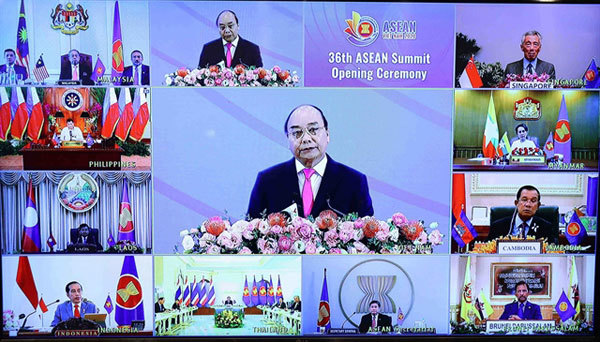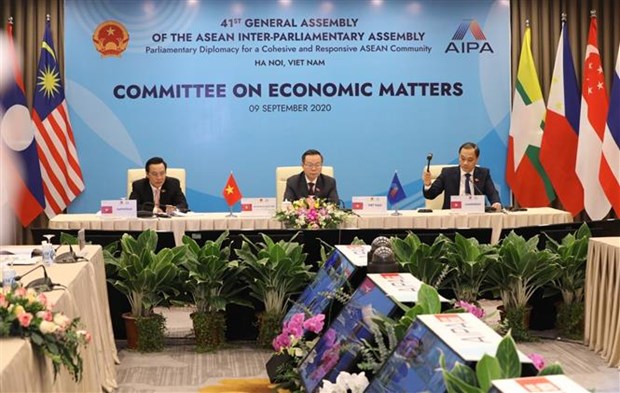 |
| Prime Minister Nguyen Xuan Phuc chairs the 36th ASEAN Summit held online in June. — VNA/VNS Photo |
Vietnam is proud to be a responsible and active member of the association with significant contributions to developing ASEAN.
ASEAN – a regional co-operation model
Initially established with five members, ASEAN has developed into a comprehensive and close co-operation organisation with 10 member countries, namely Indonesia, Thailand, the Philippines, Singapore, Malaysia, Brunei, Vietnam, Laos, Myanmar and Cambodia.
From a population of about 260 million when it was first established, ASEAN is now home to 650 million people, with a GDP of more than US$3.2 trillion and a trade turnover of $2.8 trillion in 2019.
Since its establishment, despite differences in religion, development level, infrastructure and information technology, member countries have always supported, helped and developed together in all fields. ASEAN has proved its important role in making Southeast Asia into a peaceful, prosperous and stable region.
The most important success of ASEAN over the past five decades is to ensure peace and stability in Southeast Asia and member countries have built co-operative relations which have continuously developed.
Differences between members or disputes have been all prevented and resolved based on common interests. The foundation for the successes over the past five decades has been the regional co-operation mechanisms of ASEAN implemented through treaties, forums, conferences, projects and development programmes.
After five decades, ASEAN has developed into a dynamic economy with rapid growth and become the fifth-largest economy in the world with a total GDP of about $3 trillion.
ASEAN has signed six free trade agreements with seven top trade partners in the world and is expected to become the fourth-largest economy in the world by 2050.
Together with economic development, the living conditions of people in ASEAN have improved. Per capita income has increased from $130 since it was established to $4,700 at present.
Socio-cultural co-operation among member countries has been promoted, helping increase understanding and solidarity between people of Southeast Asian countries as well as between countries in the region and in the world. Human rights and basic freedom rights have been promoted and protected.
ASEAN has also expanded partnership with other countries, becoming an important partner of big countries inside and outside the region. So far, 93 countries outside the region have sent ambassadors to ASEAN and ASEAN has set up 54 ASEAN Committees in third countries and international organisations to promote co-operation issues of ASEAN concern as well as to promote ASEAN's image to the world.
Vietnam’s contributions
Vietnam joined ASEAN and became its seventh member on July 28, 1995. This was a milestone marking the regional integration process of Vietnam as well as the co-operation and connection process of the region.
Over the past 25 years, Vietnam has demonstrated its goodwill, efforts, enthusiasm and responsibility, making significant contributions to the common achievements of ASEAN.
Right after joining ASEAN, Vietnam promoted the admission of Cambodia, Laos and Myanmar to ASEAN, completing the idea of an ASEAN with 10 Southeast Asian nations.
In 1998, Vietnam successfully hosted the sixth ASEAN Summit. The Hanoi Action Plan introduced at the summit helped maintain co-operation and enhanced the position of the association during the Asian financial crisis in 1997-98.
Vietnam also gained many achievements as Chairman of the 2001 ASEAN Standing Committee and Chairman of ASEAN 2010. The country helped promote the establishment of the ASEAN Community in 2015, helping strengthen its role and position in the international arena.
Vietnam has introduced many initiatives which were put into practice, including the ASEAN Defense Ministers’ Meeting with its partners (ADMM+) and the establishment of the ASEAN Commission on Promotion and Protection of the Rights of Women and Children.
Vietnam has played a key role in defining development goals and orientations as well as formulating major policies of ASEAN such as the ASEAN Charter, the 2015 ASEAN Community Construction Roadmap, the Vision 2020 and many other important agreements.
As a co-ordinator, Vietnam has fulfilled its role in connecting, expanding and deepening relations between ASEAN and strategic partners such as China, the US, Russia, Japan, the Republic of Korea, the EU, Australia and India.
The year 2020 marks an important milestone as Vietnam takes on the role of ASEAN Chair. This event is more special as ASEAN and the world have had to cope with the COVID-19 pandemic. As ASEAN Chair with the spirit of this year’s theme of 'Cohesive and Responsive', Vietnam has led and co-ordinated joint efforts of ASEAN and its co-operation with partners to prevent the spread of the disease and mitigate the pandemic’s socio-economic impacts.
Not only succeeding in keeping the COVID-19 under control, Vietnam was appreciated by leaders of many countries for being willing to support countries in the region and the world in the fight against the disease as well as share prevention and control experiences. VNS

Vietnam actively contributes to strengthening ASEAN solidarity
Since joining the Association of Southeast Asian Nations (ASEAN) 25 years ago, Vietnam has rapidly integrated and deeply participated in all cooperation areas of ASEAN,

Vietnam makes major contributions during its AIPA Presidency
Vietnam is making positive contributions during its Presidency of the 41st General Assembly of the ASEAN Inter-Parliamentary Assembly (AIPA 41) for a cohesive and responsive ASEAN Community, the Foreignaffairassia website has said.